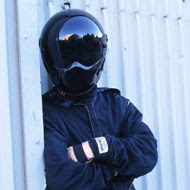
After literally spending all-night at the New Bev watching a slew of, uh, let's be diplomatic and call them "interesting" horror films (Stay tuned for that story), I did the only rational thing a human being would do on Sunday and (Following a power nap) saw another scary movie, W.
Very interesting film, this one, focusing much more on the man himself and everything that shaped him than most of the events that will define his presidency. Oddly enough, though, the man is largely defined by the influence that several people in the background wield over him.
The first act deals with his younger years that are defined by alcoholism, several failed careers and the constant disappointment of his family, who very clearly favor Jeb Bush. The second is his redemption as he marries Laura Bush, gets sober, finds Christ, becomes governor of Texas much against his family's wishes and without their support and, ultimately, ascends to the presidency in what he believes is his divine calling. This leads to a third act that isn't his presidency but merely the Iraqi invasion, and I was really surprised at how sympathetic Oliver Stone seems to be toward Bush. Stone very clearly places the blame for the fiascos the world has suffered the last eight years largely on the same three shoulders most of us do:
Donald Rumsfeld: A loose cannon who seizes control of the Iraqi invasion in its infancy.
Dick Chaney: The quiet manipulator who understands how to finesse the headstrong, stubborn president as well as take advantage of his inattention to detail.
Karl Rove: Always lurking in the shadows. You can't always see him but you know he's there. He's a puppeteer who settles for pulling Bush's strings from behind the curtain because he doesn't have what it takes to stand behind the podium himself.
Ultimately, though, the film places a lot of blame on George senior, who is cold, distant and seemingly offers his son nothing but constant reminders of what a disappointment he is as the younger George blunders his way through the first half of his life. The film subltly argues that George Jr's heart is in the right place, but the misguidance of the Rumsfeld/Chaney/Rove triumverate as well as his burning desire to separate himself from his father and clearly define his own presidency leads to the foolish desicion to invade Baghdad.
So much has been written over the last few years about Bush's presidency that the film confidently chronicles the Iraqi blunders without any undue malice. Most of my disappointment over the past few years has fallen on Colin Powell, and this movie cements it. The film doesn't presuppose Chaney and Rumsfeld's motivation, but it doesn't take much conspiracy theory to assume why men who made fortunes in the war and oil businesses would want to go to war over oil. Powell was the one guy in the room who knew better; The voice of reason who tried to cut through the cabinet's hubris by telling them in no uncertain terms that not only is the invasion wrong it isn't going to be nearly as easy as they think it will be. I cringed and shuffled in my seat as I watched his futile battle with the Chaney/Rumsfeld two-headed beast for the president's influence, and my heart breaks as the film later shows Powell stand before the United Nations and effectively sell an invasion that he doesn't believe in.
The other very interesting figures are his enablers: Laura Bush and Condeleeza Rice. The first-lady crosses him once and learns never to do it again. Though he isn't abusive, she learns his fiery temper is just best to be avoided. Rice never offers anything but affirmation to the president. She doesn't cross Chaney or Rumsfeld, she doesn't back Powell and she never expresses even a hint of disatisfaction or anything resembling an opposing viewpoint. What other type of wife/secretary of state could've survived with such a bullish figure? Maybe we should ask the one who resigned shortly after his appearance before the U.N.
I've spoken a lot about the film's message and very little about its nuts and bolts. W. is very effective, and the peformances are strong. (Particularly Josh Brolin as W. and a frighteningly balls-on portrayal of Cheney by Richard Dreyfuss.) But the film geek in me couldn't help but take a back seat to the pissed-off American who's disgusted at the mess his country has created.







No comments:
Post a Comment